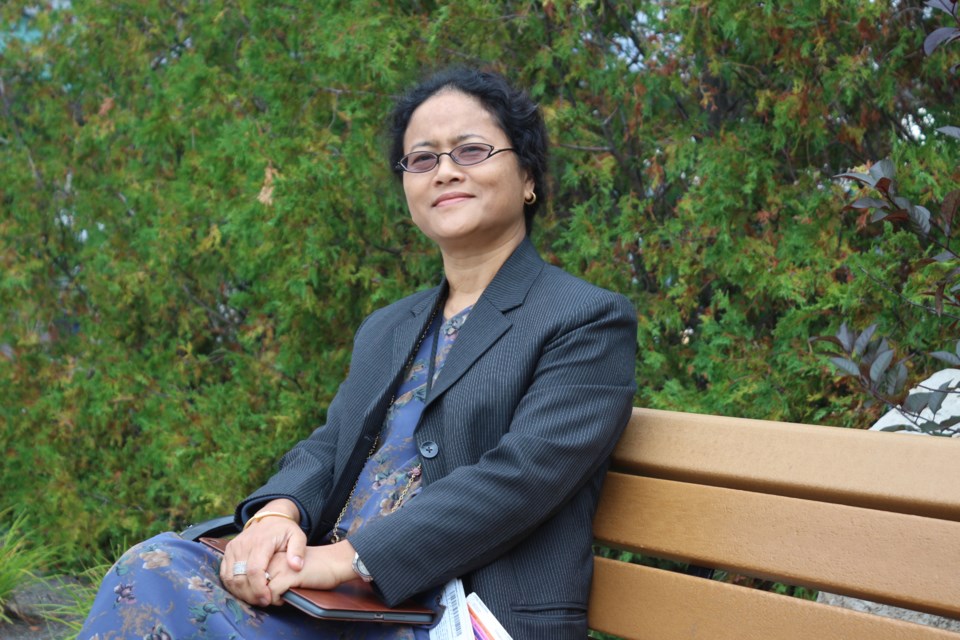Today — Monday, Sept. 10 — is World Suicide Prevention Day across the globe, a day that aims to spread awareness and the message that suicide is preventable.
The day was founded in 1960 by the International Association for Suicide Prevention (IASP), and has grown to be observed in more than 70 countries around the world with educational and commemorative events, conferences and social media campaigns.
Here in Sudbury, the North East Suicide Prevention Network will host its second World Suicide Prevention Day event at the Katherine Bell Gazebo in Bell Park today at 5 p.m., where friends and families who have lost loved ones to suicide will gather to release butterflies to honour their memories.
"The purpose of this day is really to create a network of awareness and to provide education about suicide," said Dr. Lakyntiew Aulakh, chief of the department of psychiatry, Health Sciences North.
"It's to be able to learn more about the prevalence rates of suicide, the cause of it, so we can do research to come up with preventative measures and to come up with treatment."
Not unlike many issues that stem from the overarching subject of mental health, suicide does not have one specific cause or effect and can make diagnosing a person who may be at risk of suicide a difficult task for health care professionals.
Similar to other mental health symptoms such as overdose, suicide does not discriminate and anyone can be affected by it.
"Suicide is a symptom of a bigger underlying problem," said Aulakh. "Things like drug use, or depression, or job loss on their own usually will not push someone to commit suicide.
“It's a combination of these things happening at the same time. When someone has lost a relationship, is estranged from their family, is using drugs, is without a home, this combination of things can push someone to think about suicide."
The prevalence rates of suicide in Canada are around 11.5 - 12 out of every 100,000 people (0.012 per cent). These are completed suicides, with the 49-55 year old age group accounting for the largest percentage of that number.
Women account for just five suicides out of every 100,000 Canadians, while men range from 18 up to 25 per 100,000, however, women have a higher prevalence of suicide attempts.
"Men tend to use more lethal measures, like hanging or a deadly weapon," said Aulakh.
In Northern Ontario, the numbers outpace the Canadian average by a large margin, due in most part to the high rates of suicide among First Nations peoples. The gap between men and women's suicide numbers is also staggering with Indigenous people, as Indigenous men account for 126 suicides out of 100,000 while Indigenous women account for 35 out of 100,000, a number that still nearly triples the Canadian average.
"It is certainly a concern for our area as we have many Indigenous people living in Northern Ontario," said Aulakh. "What's startling is that with First Nations, it's far more prevalent at younger ages, where it's middle aged that has the highest rate in Canada, but among First Nations it's people 25 years of age or younger, even as young as nine years old."
Aulakh explains that suicide can be a biological trait, and could be part of the reason for high suicide rates among First Nations.
"Indigenous people have suffered historical traumas, and these symptoms seem to be passed down through generations," said Aulakh. "Again, it's a combination of factors when you look at things like residential schools, poverty, and social isolation."
In 2016, there were 20 reported suicide deaths in Greater Sudbury, with 18 of those being male, and two female. In that same year, the majority of suicides were people between the ages of 50-59, with nine total. Two suicides in 2016 were people between the ages of 10-19.
In addition to using more lethal means, Aulakh says that men tend to be less open to seeking help when they're suffering from mental health issues or considering suicide.
"There tends to be an attitude of 'man up, get over it' when we talk about men who are struggling with these things," said Aulakh. "Instead it should be 'you are man enough to get help, let's talk about this', and that is applicable to everyone. People suffer in silence and you see someone who is successful in life and seems to be doing well, and you never know what they're going through until it's too late."
The main objective of World Suicide Prevention Day, Aulakh says, is to make people aware of the issue and to form a network of health.
"There is still a stigma attached to suicide and we want people to know that there is help available," said Aulakh. "It's also about educating people to notice the signs. If you notice someone has become withdrawn, or more quiet than usual, or acquiring weapons, or writing notes, these are all signs to look for."
Sudbury has a crisis intervention program located at 127 Cedar St. that can also be reached at 705-675-4760.
The Canadian Mental Health Association Sudbury/Manitoulin, in partnership with United Way Centraide North East Ontario, Health Sciences North, Northern Initiative for Social Action and a cross-sectoral group of other organizations will be holding a life promotion and suicide prevention summit on Sept. 26 at Laurentian University.
This event is free and you can register here.
"If you're having these thoughts, call the crisis centre or 911," said Aulakh. "Suicide is a permanent solution to a temporary problem."
